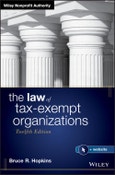Tax-exempt law explained, for lawyers and nonlawyers alike
The Law of Tax-Exempt Organizations has, for decades, been the definitive single-volume source of legal information for nonprofit lawyers and managers alike. Author Bruce R. Hopkins is widely recognized as the leading authority on the subject; in this thoroughly revised Twelfth Edition, he provides all the updates you need to stay current on the latest changes to tax code, regulatory, and case law developments. Annual supplements available with the book will ensure that you don't miss any important updates.
Making solid decisions about the future of any tax-exempt organization requires a firm and up-to-date understanding of the relevant tax and other law. This reference provides guidance on the latest developments in eligibility for tax exemption, the private inurement and private benefit doctrines, nonprofit governance, lobbying, political campaign activity, public charities, private foundations, donor-advised funds, unrelated business activities, reporting, disclosure requirements, and more.
- Understand the tax code, regulations, and case law pertaining to all categories of tax-exempt organizations
- Access the nonprofit law standard reference guide, written by the leading legal expert on tax-exempt organizations
- Prepare yourself to make well-founded strategic decisions about the current and future actions of your organization
- Review annual supplements that provide plain-English information on changes for each tax year
Written in a practical format that’s accessible to lawyers and non-lawyers alike, The Law of Tax-Exempt Organizations, Twelfth Edition, is a trustworthy resource for anyone involved in advising or managing charitable organizations, social welfare entities, associations, clubs, or any other type of tax-exempt entity.
Table of Contents
About the Authors xxiii
Preface xxv
About the Online Resources xxxi
Book Citations xxxiii
Part One: Introduction to The Law of Tax-Exempt Organizations
1 Definition of and Rationales for Tax-Exempt Organizations 3
2 Overview of Nonprofit Sector and Tax-Exempt Organizations 21
Part Two: Fundamentals of The Law of Tax-Exempt Organizations
3 Tax Exemption: Source and Recognition 33
4 Organizational, Operational, and Related Tests and Doctrines 39
5 Nonprofit Governance 87
Part Three: Tax-Exempt Charitable Organizations
6 Concept of Charitable 109
7 Charitable Organizations 139
8 Educational Organizations 207
9 Scientific Organizations 229
10 Religious Organizations 237
11 Other Types of Charitable Organizations 271
12 Public Charities and Private Foundations 285
Part Four: Other Tax-Exempt Organizations
13 Social Welfare Organizations 325
14 Business Leagues and Similar Organizations 337
15 Social Clubs 363
16 Labor, Agricultural, and Horticultural Organizations 379
17 Political Organizations 389
18 Employee Benefit Funds 403
19 Other Categories of Tax-Exempt Organizations 417
Part Five: Principal Exempt Organization Laws
20 Private Inurement and Private Benefit Doctrines 473
21 Intermediate Sanctions 521
22 Legislative Activities by Tax-Exempt Organizations 549
23 Political Campaign Activities by Tax-Exempt Organizations 577
24 Unrelated Business: Basic Rules 601
25 Unrelated Business: Modifications, Exceptions, Special Rules, and Taxation 675
Part Six: Acquisition and Maintenance of Tax Exemption
26 Exemption Recognition and Notice Processes 707
27 Administrative and Litigation Procedures 741
28 Operational Requirements 771
Part Seven: Interorganizational Structures and Operational Forms
29 Tax-Exempt Organizations and Exempt Subsidiaries 815
30 Tax-Exempt Organizations and For-Profit Subsidiaries 827
31 Tax-Exempt Organizations and Joint Ventures 843
32 Tax-Exempt Organizations: Other Operations and Restructuring 857
Index 873








